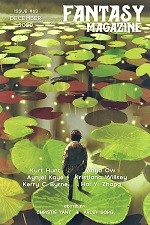 Fantasy Magazine #62, December 2020
Fantasy Magazine #62, December 2020
“An Indefinite Number of Birds” by Kurt Hunt
“If These Walls Whispered What Would We Heart?” by Aynjel Kaye
“Umami” by Anya Ow
“Tiny House Living” by Kristiana Willsey
Reviewed by Tara Grímravn
After a four-year hiatus, Fantasy Magazine relaunched last month with Issue #61. The November issue was quite well-received, and so they’re back again this month with Issue #62. As with last month’s selections, the editors bring a mix of editorials, articles, poetry, and short stories to the table.
“An Indefinite Number of Birds” by Kurt Hunt
During a bout of panicked anxiety over their relationship, Stanley asks JD how much he loves him. JD’s answer, “How many birds are in the sky?”, sends Stanley into a birdwatching frenzy, his trust in the security of their love diminishing a little more each day as he sees fewer and fewer birds. A few weeks later, JD surprises him with a trip to Arizona, filling Stanley with dread that this might be the end of their relationship.
I am somewhat unsure why this story is included in a magazine that supposedly focuses on the fantasy genre. While it is a touching and heartfelt tale (and genuinely a good read for those who like contemporary fiction), it doesn’t read as fantasy to me. The “magic” or “fantasy” element is nothing more than a large group of birds appearing on the patio at the end. Frankly, it’s too tenuous a connection to the genre, and labeling it as such is a tad disingenuous. Still, as mentioned, it’s a great read for contemporary fiction.
“If These Walls Whispered What Would We Heart?” by Aynjel Kaye
Our unnamed narrator and her friend, Robin, are eight years old and having their first sleepover. Unlike the last friend to stay, Robin doesn’t balk at the nightlight burning in the corner of the room. Instead, she admits that her house is afraid of the dark, too—a fact that cements their relationship for years to come.
Like the last story, Kaye’s piece of flash fiction is a heartwarming and gentle tale of love. The fantasy here takes a back seat, to be sure, but it is there and visibly present. I had expected something a bit darker at the admission that the house is alive (let’s face it—that’s what I always look forward to), but I like the direction this takes by including the house as a positive part of their relationship. It is said, after all, that home is where the heart is.
“Umami” by Anya Ow
Temporarily transported from her restaurant to the wilderness, chef Yun San finds herself staring into the face of a fushi, a divine magical beast whose flesh has become prized for bringing luck and prosperity to those who consume it. The creature calls itself Jin and asks her to help its kind, who have been hunted to near extinction just to sate human appetites. She wants Yun San to create better dishes thus inspiring others to do the same so that fushi flesh loses its popularity. The chef agrees, but states that it requires a sacrifice—having never worked with fushi as an ingredient before, she will need to make the best dishes she can to determine how best to proceed with making something to surpass them. When Jin brings the necessary ingredients, Yun San is faced with an uphill battle to change the hearts of the people—including that of the Emperor himself!
In general, I am not a fan of overtly preachy stories bearing social or environmental messages, especially when story and characterization are sacrificed for the sake of the message. For one, they can start to feel derivative and redundant and, two, like many others, I read genre fiction for the love of a good story, not to sit through a morality lecture (something I, with my leanings towards moral nihilism, find especially disagreeable). While Ow’s tale centers around an obvious message, that of human greed and its effects on wildlife (as stated outright in the dialogue), I don’t feel that it crosses the line too much. The narrative doesn’t collapse under the weight of the message, as often happens, and Yun San and Jin are both delightful characters.
“Tiny House Living” by Kristiana Willsey
Tired of living with roommates in a seemingly endless parade of sublets, Jude moves into a walnut shell. It’s snug and cozy, containing everything she needs. Her home might be small, but she feels happy and content, nonetheless. Unfortunately, as things in her life begin to take a downturn, Jude is forced to make do with less and less.
Willsey’s short story (topping off at 1,402 words) is an exercise in symbolism and the abstract. The imagery is strange, such as the idea of someone moving from a normal apartment into a walnut shell and increasingly smaller objects, but the meaning is clear even if it is couched in so much symbolism. The struggle that so many in today’s world face is evident in this narrative, as is the eagerness of those willing to exploit the less fortunate. The notion of having to make do with less and less until, finally, one is forced to sacrifice everything just to exist, to the point of losing one’s identity completely, becoming just another object off which someone else will profit. An interesting read, to be sure!